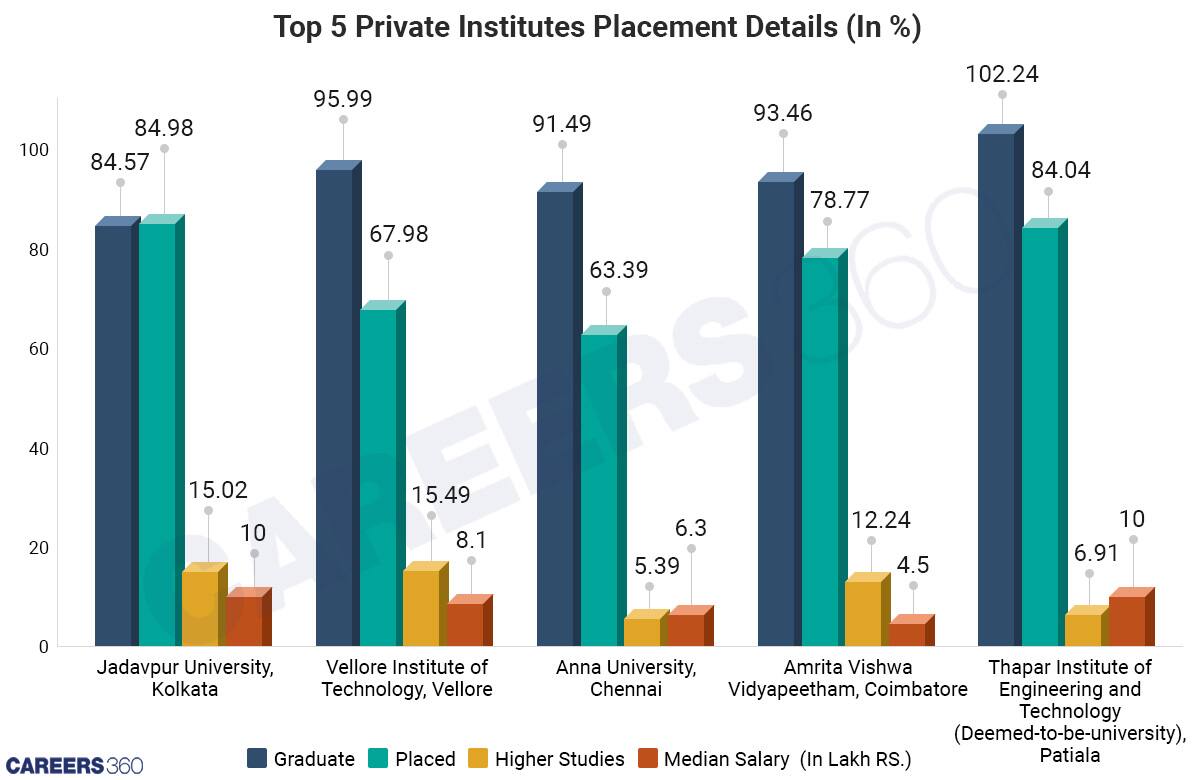NIRF 2023 Analysis: Top 5 Non IIT Engineering Colleges Offering Unique Specialisations
According to the recently released NIRF ranking of top 100 engineering colleges across India, the states with the maximum number of ranked colleges collectively hold 67 institutes. However, only 13 of these 67 institutes rank among the top 20.

States like Rajasthan and Andhra Pradesh feature among the states with maximum ranked colleges, but neither had a single engineering college among the top 20.
The National Institutional Ranking Framework (NIRF) has established itself as a credible ranking system, which assesses the overall performance and quality of educational institutions in India every year.
This analysis explores the top 10 states with the highest number of NIRF ranked engineering colleges. Our analysis concludes that Tamil Nadu has an exceptional presence in the top 20.
Careers360 has undertaken an in-depth analysis on recently released NIRF data on engineering colleges. For the benefit of engineering aspirants we have limited our analysis to the top 10 states with the highest number of NIRF ranked engineering colleges. We have also added the top five Non IITs engineering colleges along with their unique specialisations and other important information.
Also Check- Placement Analysis: In Depth Comparison Of 1st, 2nd and 3rd Generation IITs
States With Most Number of Ranked Colleges
Among the 100 engineering colleges ranked this year, Tamil Nadu (TN) stands out with 15 colleges featuring in the ranking. If one has to consider 10 states with the highest number of colleges ranked in this category, Tamil Nadu still tops the list while Uttar Pradesh comes in second. Refer to the table below to know in detail.
Top 10 states with Highest Number of Ranked College
State | Top 20 | NIRF COlleges |
Tamil Nadu | 5 | 15 |
Delhi | 1 | 7 |
Karnataka | 1 | 7 |
Uttar Pradesh | 2 | 7 |
Punjab | 1 | 6 |
Telangana | 1 | 6 |
Maharashtra | 1 | 5 |
Odisha | 1 | 5 |
Rajasthan | 0 | 5 |
Andhra Pradesh | 0 | 4 |
As you can see, Tamil Nadu (TN) has the most prominent presence in the top 20 colleges list, with 5 of its colleges being ranked in the top 10. Delhi, Karnataka, and Uttar Pradesh also have one college each in the top 20 rankings.
Which Are The Top 20 Engineering Colleges?
In the table below, you will see a list of top 20 engineering colleges across India, as ranked by the NIRF for 2023. You will notice that most of these colleges are IITs and a few NITs. These institutions have been featured in the NIRF ranking ever since its inception. There is no doubt that the quality of education, the placements, the legacy of the institution itself contributes largely to their position in the ranking. But for this analytical report, we have left these institutes out, as they are well-established and widely recognised institutions. Some have been already extensively covered in other reports by Careers360.
Top 20 Engineering Colleges In India: NIRF 2023
Name | Rank | State |
Indian Institute of Technology Madras | 1 | Tamil Nadu |
Indian Institute of Technology Delhi | 2 | Delhi |
Indian Institute of Technology Bombay | 3 | Maharashtra |
Indian Institute of Technology Kanpur | 4 | Uttar Pradesh |
Indian Institute of Technology Roorkee | 5 | Uttarakhand |
Indian Institute of Technology Kharagpur | 6 | West Bengal |
Indian Institute of Technology Guwahati | 7 | Assam |
Indian Institute of Technology Hyderabad | 8 | Telangana |
National Institute of Technology Tiruchirappalli | 9 | Tamil Nadu |
Jadavpur University, Kolkata | 10 | West Bengal |
Vellore Institute of Technology, Vellore | 11 | Tamil Nadu |
National Institute of Technology Karnataka, Surathkal | 12 | Karnataka |
Anna University, Chennai | 13 | Tamil Nadu |
Indian Institute of Technology Indore | 14 | Madhya Pradesh |
Indian Institute of Technology (Banaras Hindu University) Varanasi | 15 | Uttar Pradesh |
National Institute of Technology Rourkela | 16 | Odisha |
Indian Institute of Technology (Indian School of Mines), Dhanbad | 17 | Jharkhand |
Indian Institute of Technology Gandhinagar | 18 | Gujarat |
Amrita Vishwa Vidyapeetham, Coimbatore | 19 | Tamil Nadu |
Thapar Institute of Engineering and Technology (Deemed-to-be-university), Patiala | 20 | Punjab |
Also Read | JEE Coaching: Why Is It Extremely Demanding?
Unique Specialisations of Top Non IIT Engineering Colleges
Now since we have left out the IITs and NITs, we are left with but five colleges for our analysis. Let us try to understand why these feature in the NIRF 2023 Top 20 Engineering Colleges list.
To begin with these colleges are very well established and an extremely popular choice with engineering aspirants. They offer unique specialisations and competitive placements to their graduates just like their IIT counterparts. Apart from being known for the usual engineering specialisations, these have diversified and offered specialisations in Artificial Intelligence and Machine Learning, Robotics and Artificial Intelligence, Power Engineering, and more.
Find out if these top five Non IITs engineering colleges have your preferred specialisation listed in the table below.
Top Five Non IIT Colleges With Unique Specialisation (Intake and Fees)
| Jadavpur University, Kolkata |
| Specialisation: BE Instrumentation and Electronics Engineering. ... Approved Intake: 74 Course Fees (In Lakh Rs): NA |
| Specialisation: B.Tech Food Technology Approved Intake: 31 Course Fees (In Lakh Rs): NA |
| Specialisation: Production Engineering Approved Intake: 37 Course Fees (In Lakh Rs): NA |
| Specialisation: Power Engineering Approved Intake: 37 Course Fees (In Lakh Rs): NA |
| Specialisation: BE Construction Engineering Approved Intake: 32 Course Fees (In Lakh Rs): NA |
| Specialisation: BE Metallurgical Engineering Approved Intake: 28 Course Fees (In Lakh Rs): NA |
| Specialisation: BE Printing Technology Approved Intake: 23 Course Fees (In Lakh Rs): NA |
| Vellore Institute of Technology, Vellore |
| Specialisation: Biotechnology Approved Intake: 180 Course Fees (In Lakh Rs): 6,92,000 |
| Specialisation: Computer Science and Engineering (Bioinformatics) Approved Intake: 120 Course Fees (In Lakh Rs): 7,80,000 |
| Specialisation: Computer Science and Engineering (Information Security) Approved Intake: 240 Course Fees (In Lakh Rs): 7,80,000 |
Specialisation: Computer Science and Engineering and Business Systems (In Collaboration with TCS) |
| Specialisation: Computer Science and Engineering (Internet of Things) Approved Intake: 240 Course Fees (In Lakh Rs): 7,80,000 |
| Specialisation: Computer Science and Engineering (Data Science) Approved Intake: 180 Course Fees (In Lakh Rs): 7,80,000 |
| Specialisation: Computer Science and Engineering (Block Chain Technology) Approved Intake: 60 Course Fees (In Lakh Rs): 7,80,000 |
| Specialisation: Computer Science and Engineering (Artificial Intelligence and Machine Learning) Approved Intake: NA Course Fees (In Lakh Rs): NA |
| Specialisation: Computer Science and Engineering (Cyber Physical Systems) Approved Intake: NA Course Fees (In Lakh Rs): NA |
| Specialisation: Computer Science and Engineering (Artificial Intelligence and Robotics) Approved Intake: NA Course Fees (In Lakh Rs): NA |
| Specialisation: Approved Intake: Course Fees (In Lakh Rs): NA |
| Specialisation: Electronics and Communication Engineering (Biomedical Engineering) Approved Intake: 60 Course Fees (In Lakh Rs): 7,80,000 |
| Specialisation: Fashion Technology Approved Intake: NA Course Fees (In Lakh Rs): NA |
| Specialisation: Information Technology Approved Intake: 360 Course Fees (In Lakh Rs): 7,80,000 |
| Specialisation: Mechanical Engineering Approved Intake: 720 Course Fees (In Lakh Rs): 7,80,000 |
| Specialisation: Mechanical Engineering (Automotive Engineering) Approved Intake: 60 Course Fees (In Lakh Rs): 7,80,000 |
| Specialisation: Mechanical Engineering (Electric Vehicles) Approved Intake: NA Course Fees (In Lakh Rs): NA |
| Specialisation: Mechatronics and Automation Approved Intake: NA Course Fees (In Lakh Rs): NA |
| Anna University, Chennai* |
| Specialisation: Food Engineering and Technology, Approved Intake: 60 Course Fees (In Lakh Rs): 2,00,000 |
| Specialisation: Production Engineering Approved Intake: NA Course Fees (In Lakh Rs): NA |
| Specialisation: Power Engineering, Approved Intake: NA Course Fees (In Lakh Rs): NA |
| Specialisation: BE Construction Engineering Approved Intake: NA Course Fees (In Lakh Rs): NA |
| Specialisation: BE Metallurgical Engineering Approved Intake: NA Course Fees (In Lakh Rs): NA |
| Specialisation: BE Printing Technology Approved Intake: 60 Course Fees (In Lakh Rs): 1,60,000 |
| Specialisation: BE Aeronautical Engineering Approved Intake: 120 Course Fees (In Lakh Rs): NA |
| Specialisation: BE Artificial Intelligence and Data Science Approved Intake: 360 Course Fees (In Lakh Rs): NA |
| Amrita Vishwa Vidyapeetham, Coimbatore |
| Specialisation: BE Aeronautical Engineering Approved Intake: NA Course Fees (In Lakh Rs): NA |
| Specialisation: B.Tech Artificial Intelligence Approved Intake: 120 Course Fees (In Lakh Rs): 48,00,000 |
| Specialisation: B. Tech. Robotics & Artificial Intelligence (RAI) Approved Intake: NA Course Fees (In Lakh Rs): NA |
| Specialisation: B. Tech. in Automation & Robotics Engineering Approved Intake: 60 Course Fees (In Lakh Rs): 28,00,000 |
| Thapar Institute of Engineering and Technology, Patiala |
| Specialisation: Basic & Engineering Sciences (Dera Bassi Campus) Approved Intake: NA Course Fees (In Lakh Rs): NA |
| Specialisation: Chemical Engineering Approved Intake: 69 Course Fees (In Lakh Rs): 17,21,000 |
| Specialisation: Civil Engineering Approved Intake: 138 Course Fees (In Lakh Rs): 17,21,000 |
| Specialisation: Computer Science & Engineering Approved Intake: 120 Course Fees (In Lakh Rs): NA |
| Specialisation: Department of Biotechnology Approved Intake: 69 Course Fees (In Lakh Rs): 17,21,000 |
| Specialisation: Distance Education (DDE) Approved Intake: NA Course Fees (In Lakh Rs): NA |
| Specialisation: Electrical & Instrumentation Engineering Approved Intake: NA Course Fees (In Lakh Rs): NA |
| Specialisation: Electronics & Communication Engineering Approved Intake: 276 Course Fees (In Lakh Rs): 17,21,000 |
| Specialisation: Mechanical Engineering Department Approved Intake: 276 Course Fees (In Lakh Rs): 17,21,000 |
*All courses are offered at different colleges that are affiliated to Anna University, Chennai. Fees and intake may vary.
Also Read | NIT Placements: Under 83% BTech Students Placed Across Top we NITs Over 7 Years
Placement Performance At Top 5 Non IIT Colleges
Among the non IIT institutions, Jadavpur University, Kolkata had the highest number (84.98 per cent ) of candidates placed. The remaining students opted for higher education. The University also has the highest median salary of Rs 10 lakh per annum. However, there was some inconsistency on how many students were neither placed nor pursued higher studies. This was observed in data gathered from many colleges. Vellore Institute of Technology, Vellore, and Thapar Institute boast impressive graduate placement percentages and competitive median salaries.
*Note: Graduate, Placed and Higher Studies details are given In Percentage
 Non IITs Institutes
Non IITs Institutes
Tamil Nadu's dominance in the NIRF rankings signifies its status as a hub for engineering education in India. Prospective students can explore a plethora of unique specialisations offered by the top private engineering colleges, and the placement statistics indicate promising career opportunities.
Also Check- Career Opportunities For Engineers Of The Future
List of Related colleges
Browse Engineering Colleges by State
Applications for Admissions are open.
Among top 100 Universities Globally in the Times Higher Education (THE) Interdisciplinary Science Rankings 2026
Amrita University B.Tech 2026
ApplyRecognized as Institute of Eminence by Govt. of India | NAAC ‘A++’ Grade | Upto 75% Scholarships
Amity University-Noida M.Tech Admissions 2026
ApplyAmong top 100 Universities Globally in the Times Higher Education (THE) Interdisciplinary Science Rankings 2026
MIT World Peace University B.Tech Admissions 2026
ApplyHighest CTC 44.14 LPA | UGC Approved | 1600+ Recruiters | 100% Placement
Manav Rachna-B.Tech Admissions 2026
ApplyNAAC A++ Grade | Recognized as Category-1 Deemed to be University by UGC | 41,000 + Alumni Imprints Globally
Chandigarh University Admissions 2026
ApplyNAAC A+ Accredited | Among top 2% Universities Globally (QS World University Rankings 2026)
